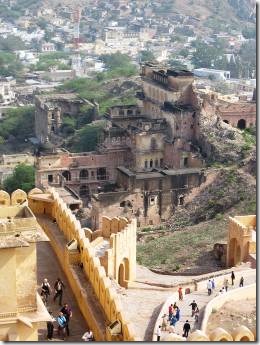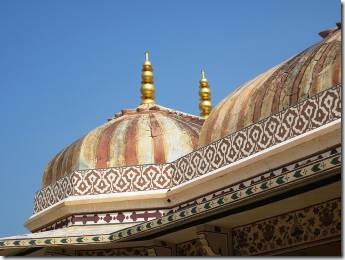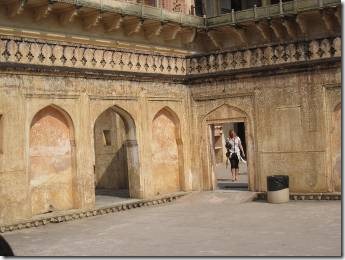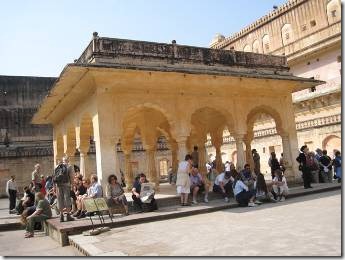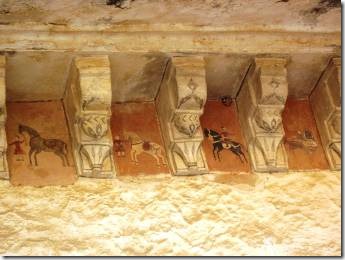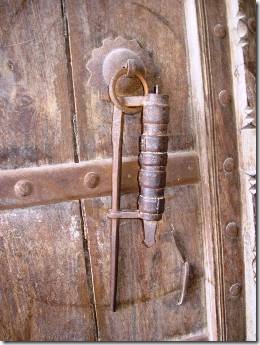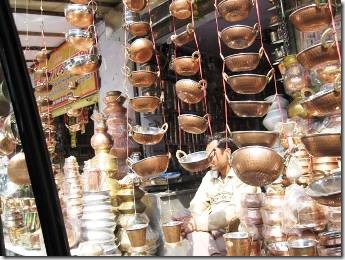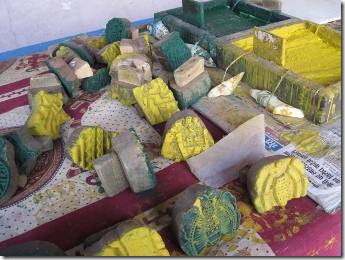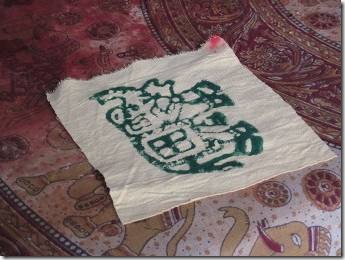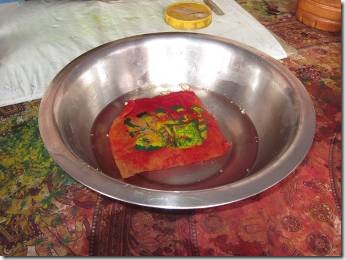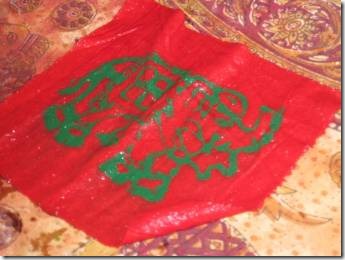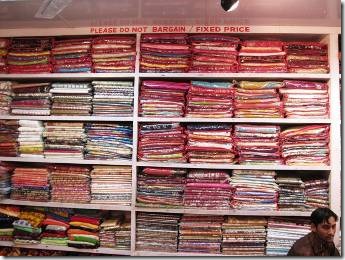I’m jumping around quite a bit in these emails. The Taj and the Ganges came at the end of our tour, but since I thought those places might be the most interesting to you, that’s where I started. When we went up north we spent 3 nights in Delhi and then drove up to Jaipur where we visited the Amber Fort, the City Palace (sort of) and the Marharaja Public Library and rode the elephant. Our tour of the Amber Fort was really quite interesting and our local guide very good. Here is part one.
Ru
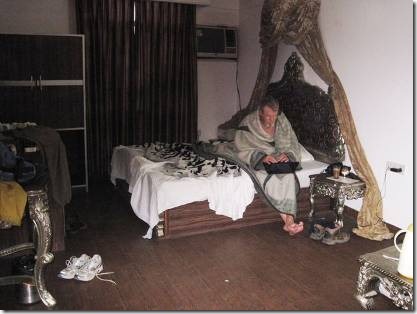
Our morning in Delhi before driving to Jaipur.
Our first hotel in Delhi was a nightmare for Linda and Michael. They had no hot water and were on the ground floor quite close to the noise from the reception desk, the front lobby and the street traffic. Randal and I were upstairs, had hot water, and though the first night was noisy the second was not and we slept pretty well. The second night, Linda and Michael were given a different room but the bed had bugs and they didn’t think a change of mattress would help so at midnight they were given yet another room in a different “sister hotel” but that one was not much better. So after the second night we all checked out and moved to a different hotel recommended by Sandeep. We all thought it was fine though Linda and Michael had to kill a couple of small roaches crawling on the floor. It was much less palatial than it looks; things aren’t maintained very well. But there were no bugs in our room and they brought a breakfast of omelets, toast, jam, butter, tea, coffee and juice to our room. It was all included for about $36 US so we couldn’t very well complain. There was even an extra blanket in the room so we didn’t have to ask and it was pretty quiet. Best of all, the hotel had wifi. Toilet paper rolls were very odd everywhere. They were so small they lasted about a half an evening! We were always asking for toilet paper everywhere we stayed. And though all of the rooms everywhere had AC, non had heat other than the space heaters we were given.
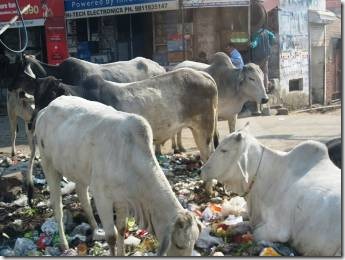
Road side scenery….
There was a ton of traffic mixing scenes from today with images from hundreds of years ago.
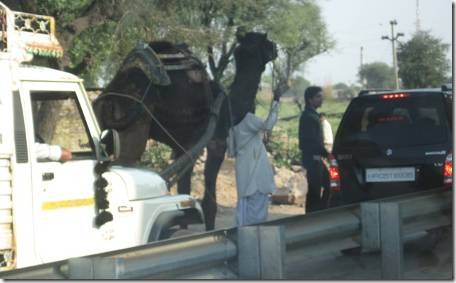
The camel cart was in line to go through the toll booth.
I have no idea what a camel cart pays for a toll. None of the camels, water buffalo, cattle, horses or goats seemed the least bit fazed by the traffic and blaring horns. Everyone honks all of the time.
Half way to Jaipur we stopped for lunch at one of the “tourist resort restaurants” where the food is more expensive, the service bad and you pay to use the bathroom. To top it off, in a few hours after eating Michael started to feel really bad, had the chills and spent the entire time in Jaipur sick…possibly from his meal. He actually went to the Jaipur Hospital. Michael, Linda, Sandeep, Sandeep’s friend who was also driving a tour group and whose mom is a doctor, and the hotel manager all went about 8 pm that night. They were back by about 10 pm with medicines and instructions for eating. It is just about impossible to get “bland” food in India because chili and pepper seem to go into everything no matter what. Linda and Randal also had some stomach issues. My stomach needed a good dose of lightly steamed vegetables with no sauce or gravy as I had the opposite problem from too much bread and rice.
Two days in Jaipur……
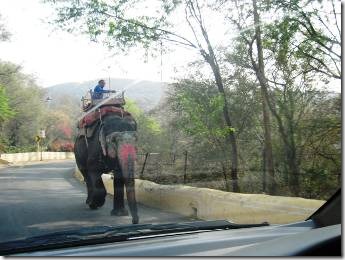
And then came the elephants..
Several passed our hotel at night walking down the main road. February is the month of weddings and lots of grooms ride to the wedding on dressed up white horses. Maybe in Jaipur they ride on elephants because we heard wedding bands and saw fireworks all three nights.
Our first morning was spent at the Amber Fort where Sandeep arranged for a local guide “provided” by his company which provides drivers for tourists and works with the tour companies like the one we used to arrange our tour. We thought that meant Sandeep’s company paid the guides, but that wasn’t the case. We paid the guide with “tips” and if we bought things at the “handicraft emporiums” they would get some type of commission. Our visit to the Taj Mahal and Rishikesh worked the same way. The sales pitches seem to be included in tours everywhere. We don’t normally take tours, but when we visited Beijing and Tibet both had “shopping stops” included with the tours and actually many tourists seem to like it. Our local guides were all quite good and put up with our somewhat limited attentions spans related to Mughal emperors and Hindu deities and the fact that we never bought anything except one time at the Marble Palace.
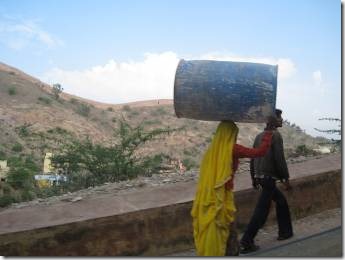
I hope the barrel is empty!
Not in a million years could I do this: we passed this couple on our way to the Fort.
“Amber Fort is located at a distance of 11 kilometers from Jaipur and was the old fort of the Kachhwaha clan of Amer, which used to be the capital, till it was moved to Jaipur. The construction of the Amber Fort began in the year 1529 AD and was started by Man Singh I. The exterior of the Fort is not in the least like its interiors. The outside is very imposing and rugged looking whereas the inside is a comforting and warm interior which is influenced by both Hindu and Muslim style of ornamentation. On the walls are paintings depicting various hunting scenes ( and the Karma Sutra) and there is also a lot of work on the walls, which are covered with intricate carving, mosaic and minute mirror work that makes the halls look very majestic and imperial. The fort is built with white marble and red sandstone and looks even more attractive because of the Maota Lake in the foreground.” India Cards postcard booklet
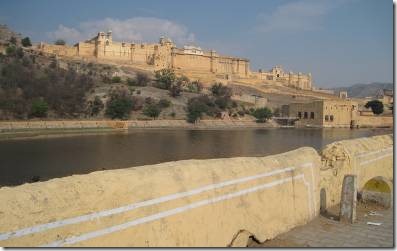
The “rugged outside “of Amber Fort and Maota Lake which is man-made.
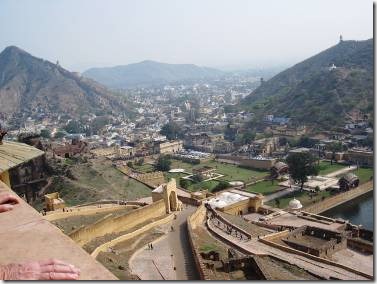
Amber Fort was built on one of the mountains overlooking Jaipur: I’ve taken this photo from inside. The city walls go up the sides of the mountains in the distance and you can see guard towers here and there along the walls.
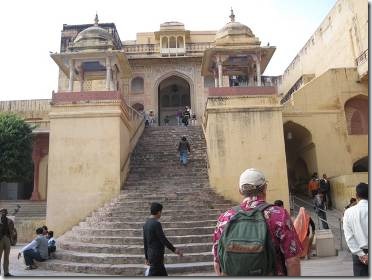
Inside the walls were an administrative building, living areas for the Raja and his wives, a temple, gardens, a dance area, court yards, a small bazaar arcade……
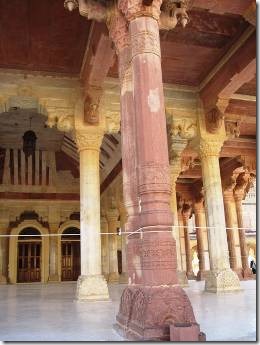
The Mughals were Muslims, but living in Hindu India they mixed Hindu elements into their architecture. Our guide told us that the pink sandstone represents the Hindu aspects and the white marble, the Muslim and that the Amber Fort was one of the first structures to mix the two architectural aesthetics. I believe this building was used for administrative work so non-family members and “the public” were allowed here.
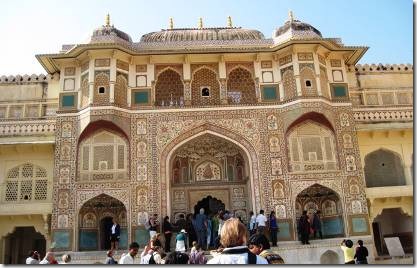
I believe this building was the Raja’s palace.
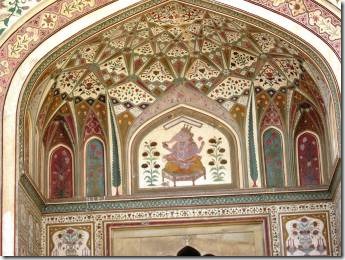
The walls and ceilings were heavily decorated.
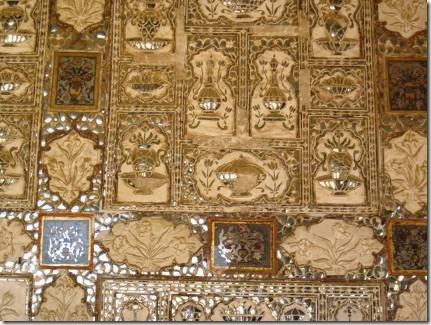
The walls had pieces of glass and jewels inlaid.
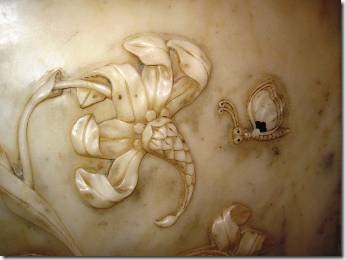
What do you see?
This was a relief on one of the pillars. Our guide asked us what we saw other than a flower and a butterfly. I finally saw an elephant’s trunk in the bottom of the flower. A scorpion, a cobra, fish, a cow’s tail and there were images in the butterfly too, but I can’t remember.
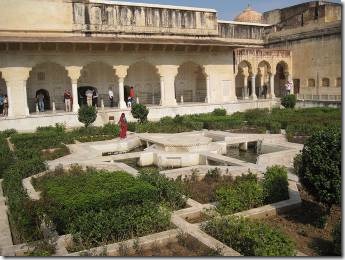
The garden…maybe once it had flowers…
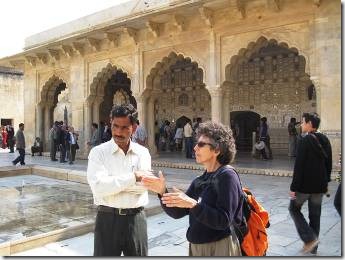
Our guide listening to a question from me.

